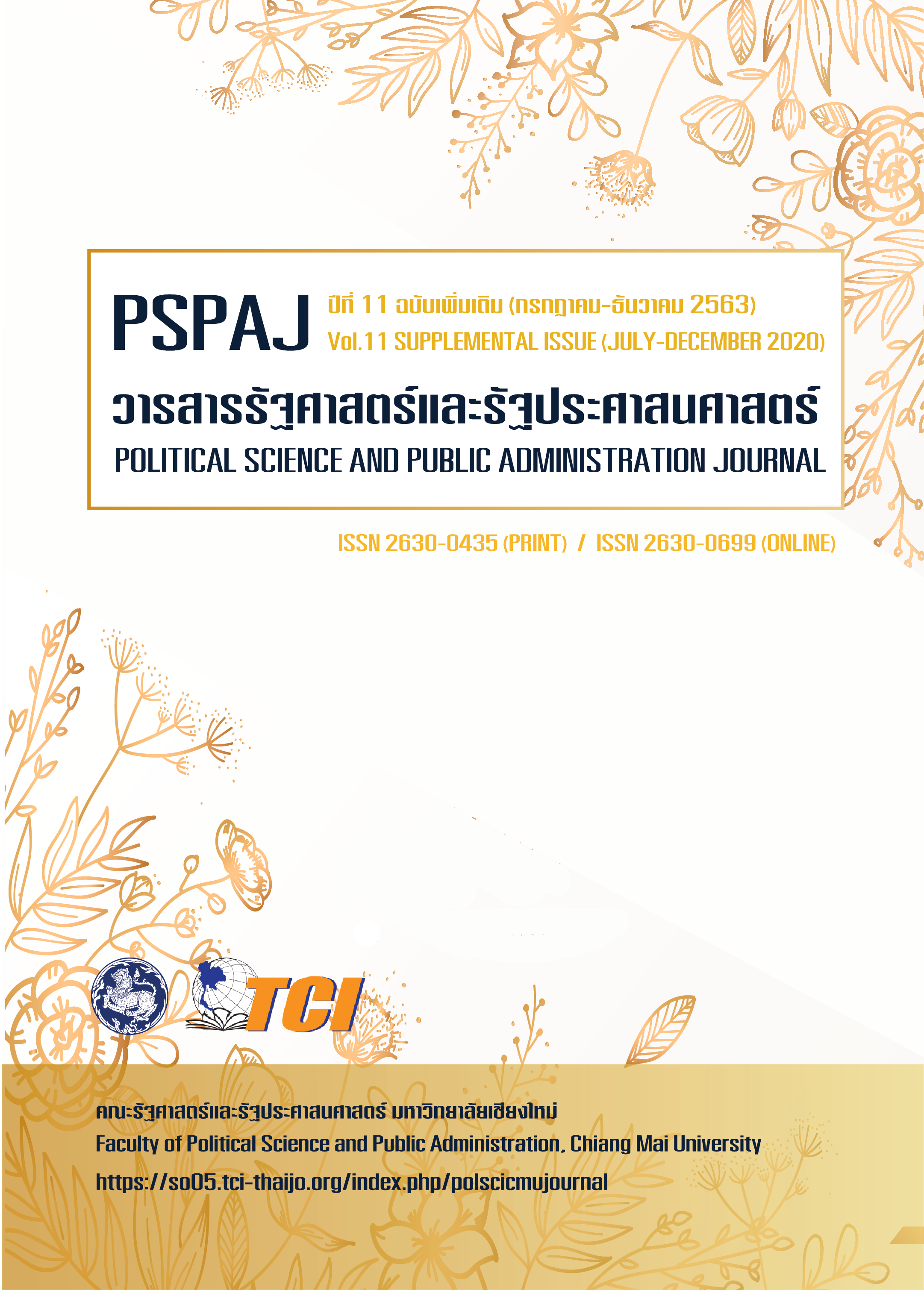The Glass Ceiling and the Political Roles of Thai Women in the Electoral System
Main Article Content
Abstract
This article combined the documentary data and the interview with local leaders and politicians. This article aimed to present data and approach on the women roles in politics and also explained the idea of ‘The Glass Ceiling.’ It herein referred to a transparent boundary that can be seen, but impenetrable. It was a concept that described the inequality between women and men, and the inequality among minorities, who were hindered in terms of opportunity and rightful power. This deprivation, consequently, led to the gender inequality, as found in economic, political, social and cultural systems. The evident key conditions affecting the women’s opportunity to win the votes in election. It was a fundamental belief that having women to perform the role of Members of Parliament would impact the political situation, reduce conflicts, and create diversity in policy. The quota system should, therefore, be put in place as a law and should go hand in hand with the process of building values and embracing gender diversity. Political parties were the primary sources, which manage the proportion of their female representatives in elections. Ultimately, the aim of this proposition is to open up an equal political space, which is a true democratic development process.
Downloads
Article Details
- เนื้อหาและข้อมูลที่ลงตีพิมพ์ในวารสารรัฐศาสตร์และรัฐประศาสนศาสตร์ถือเป็นข้อคิดเห็นและความรับผิดชอบของผู้เขียนบทความโดยตรง ซึ่งกองบรรณาธิการวารสารรัฐศาสตร์และรัฐประศาสนศาสตร์ ไม่จำเป็นต้องเห็นด้วย หรือร่วมรับผิดชอบใดๆ
- บทความและข้อมูล ที่ได้รับการตีพิมพ์ในวารสารรัฐศาสตร์และรัฐประศาสนศาสตร์ ถือเป็นลิขสิทธิ์ของวารสาร หากบุคคลหรือหน่วยงานใดต้องการนำข้อมูลไปใช้ประโยชน์ในทางวิชาการ ขอให้อ้างอิงแหล่งที่มาด้วย
References
BBC. (2561, 6 กุมภาพันธ์). “ครบรอบ 100 ปีผู้หญิงอังกฤษมีสิทธิ์เลือกตั้งครั้งแรก”. สืบค้นเมื่อ 11 มิถุนายน 2563, จาก https://www.bbc.com/thai/international-42958673
Techsauce. (2562, 19 มีนาคม). หญิงไทยอยู่ตรงไหนในโลกการเมือง? ทำไมผู้หญิงถึงประสบความสำเร็จในโลกธุรกิจมากกว่า. สืบค้นเมื่อ 7 มิถุนายน 2563, จาก https://techsauce.co/saucy-thoughts/why-thai-women-are-so-successful-in-business-but-not-politics#
Thaipublica. (2562, 6 มีนาคม). ส.ส.หญิงในสภาทั่วโลกเพิ่มขึ้น รวันดาอันดับหนึ่งคว้าที่นั่งสูงสุด-ไทยอันดับ 182 จากเลือกตั้งปี 2557. สืบค้นเมื่อ 2 สิงหาคม 2563, จาก https://thaipublica.org/2019/03/woman-in-parliament-politics/
Theerapat Charoensuk. (2561, 16 May). ในวันที่รวันดาพัฒนาแล้ว!. สืบค้นเมื่อ 2 สิงหาคม 2563, จาก https://www.the101.world/rwanda/
คมชัดลึก. (2554, 23 กันยายน). ชี้ผู้นำสตรีอุษาคเนย์ล้วนตระกูลหนุน. สืบค้นเมื่อ 20 สิงหาคม 2563, จาก https://www.komchadluek.net/news/politic/109978
______. (2558, 8 มีนาคม). เปิดโมเดลทั่วโลก 'สิทธิสตรีในการเมือง. สืบค้นเมื่อ 10 สิงหาคม 2563, จาก https://www.komchadluek.net/news/politic/202592
ตรีวิทย์ อัศวศิริศิลป. (2560). การเสริมสร้างความเสมอภาคระหว่างหญิงชาย: ความเป็นไปได้ของการนําระบบโควตาผู้หญิงในการเมืองมาใช้ในสังคมไทย. SOUTHEAST BANGKOK JOURNAL, 3(2), 109-126.
ประชาไท. (2556, 8 ธันวาคม). แคเธอรีน บาววี: ข้อท้าทายของประวัติศาสตร์นิพนธ์ว่าด้วยสิทธิการเลือกตั้งสตรีไทย. สืบค้นเมื่อ 28 พฤษภาคม 2563, จาก https://prachatai.com/journal/2013/08/48151
ผุสดี ตามไท. (2551). กรอบกฎหมาย: สิ่งเอื้ออำนวยให้ผู้หญิงเดินเข้าสู่การเมืองมากกว่าที่ผ่านมา. ใน วิทยาลัยพัฒนาการปกครองท้องถิ่น สถาบันพระปกเกล้า (บ.ก.). สตรีกับการเมือง: ความเป็นจริง พื้นที่ทางการเมือง และการขับเคลื่อน (น. 20-22). กรุงเทพ: โรงพิมพ์ธรรมดาเพลส.
ไพลิน ภู่จีนาพันธุ์. (2560). บทบาทผู้หญิงในการสร้างความเสมอภาคทางการเมืองและงานอาสาสมัครพัฒนาสังคม. วารสารสำนักบัณฑิตอาสาสมัคร, 14(1), 163-203.
ภัควดี วีระภาสพงษ์. (2009, 23 กุมภาพันธ์). การบูรณาการประเด็นเพศสถานะ ความเป็นไปได้และข้อจำกัดของแนวคิดทางสังคมที่ถึงรากถึงโคน. สืบค้นเมื่อ 25 กรกฎาคม 2563, จาก https://prachatai.com/journal/2009/02/20104
สถาบันเพิ่มผลผลิตแห่งชาติ. (2559, 4 พฤศจิกายน). การมีส่วนร่วมของแรงงานสตรีที่ส่งผลต่อผลิตภาพและการเติบโตทางเศรษฐกิจ. สืบค้นเมื่อ 29 พฤษภาคม 2563, จาก https://www.ftpi.or.th/2016/10431
สำนักงานคณะกรรมการการเลือกตั้ง. (2544). ข้อมูล สถิติ และผลการเลือกตั้ง สมาชิกสภาผู้แทนราษฎร พ.ศ. 2544. สืบค้นเมื่อ 10 พฤษภาคม 2563, จาก http://dl.parliament.go.th/handle/lirt/370906
______. (2548). ข้อมูล สถิติ และผลการเลือกตั้งสมาชิกสภาผู้แทนราษฎร พ.ศ 2548. สืบค้นเมื่อ 10 พฤษภาคม 2563, จาก http://dl.parliament.go.th/handle/lirt/426428
Bikorimana, D. (2012, 15 May). Rwanda: The Land of Gender Equality? in Think Africa Press. Retrieved August 3, 2020, from https://thinkafricapress.com/women-gender-equality/
Dahl, R. A. (1961). Who Governs? Democracy and Power in an American City. New Haven, CT: Yale University Press.
Dahlerup, D. (2003). “Comparative Studies of Electoral Gender Quotas” in International IDEA (2003) The Implementation of Quotas: Latin American Experiences, International IDEA, Stockholm. Retrieved May 23, 2020, from http://aceproject.org/ace-en/topics/pc/pcb/pcb02/pcb02b/pcb02b1#ref1
Elshtain, J. (1993). Public Man, Private Woman: Women in Social and Political Thought. Princeton, NJ: Princeton University Press.
Equal Measures 2030. (2018). Data and Analysis. Retrieved June 10, 2020, from https://www.equalmeasures2030.org/how-we-work/data-and-analysis/
International Institute for Democracy and Electoral Assistance (International IDEA). (2009). Quotas. Retrieved August 10, 2020, from https://www.idea.int/data-tools/data/gender-quotas/quotas
______. (2020). Gender Quotas Database. Retrieved August 10, 2020, from https://www.idea.int/data-tools/data/gender-quotas/country-view/143/35
Inter-Parliamentary Union. (2019, 1 February). Women in National Parliaments. from http://archive.ipu.org/wmn-e/classif.htm
______. (2020a). Percentage of Women in National Parliaments. Retrieved March 30, 2020, from https://data.ipu.org/women-ranking?month=5&year=2020
______. (2020b). Thailand: House of Representatives, Data on Women. Retrieved April 1, 2020, from https://data.ipu.org/node/170/data-on-women?chamber_id=13541&election_id=68410
Iwanaga, K. (2008). Women as Parliamentarians. In Iwanaga, K. (Ed.) Women and politics in Thailand: Continuity and Change (pp. 168-197). Copenhagen: NIAS Press.
Izharuddin, A. (2019, November). The 30% Hope Securing the Electoral Success of Women in Malaysia Baharu. Retrieved July 13, 2020, from https://www.newmandala.org/wp-content/uploads/2019/11/Alicia-Izharuddin-30-Hope-1.pdf
Lorber, J. (1994). Paradox of Gender. New Haven and London. London: Yale University Press.
Madsen, C., Preece, J, & Selway, J. (2019, 27 November). Thai Female Political Representation in the 2019 Elections. Retrieved May 15, 2020, from https://www.thaidatapoints.com/post/thai-election-pending-6
McKinsey & Company. (2019). Women in the Workplace 2019. Retrieved May 20, 2020, from https://www.mckinsey.com/featured-insights/gender-equality/women-in-the-workplace-2019#
Ministry for Culture and Heritage. (2018, 20 December). Women and the Vote. Retrieved May 18, 2020, from https://nzhistory.govt.nz/politics/womens-suffrage/world-suffrage-timeline
Morrison, A. M., White, R. P., & Van Velsor, E. (1994). Breaking the Glass Ceiling: Can Women Reach the Top of America's Largest Corporations? Boston: Addison-Wesley Publishing Company.
Pickles, K. (2018, 19 September). Why New Zealand was the First Country Where Women Won the Right to Vote. Retrieved May 18, 2020, from https://theconversation.com/why-new-zealand-was-the-first-country-where-women-won-the-right-to-vote-103219
Quorum. (2015). Working Together and Across the Aisle, Female Senators Pass More Legislation Than Male Colleagues. Retrieved May 26, 2020, from https://www.quorum.us/data-driven-insights/working-together-and-across-the-aisle-female-senators-pass-more-legislation-than-male-colleagues/
The Economist. (2009, 5 May). The Glass Ceiling. Retrieved May 25, 2020, from https://www.economist.com/news/2009/05/05/the-glass-ceiling
United Nations Development Programme. (2013). Gender Mainstreaming Made Easy: Handbook for Programme Staff. Retrieved July 30, 2020, from https://www.undp.org/content/dam/somalia/docs/Project_Documents/Womens_Empowerment/Gender%20Mainstreaming%20Made%20Easy_Handbook%20for%20Programme%20Staff1.pdf
United Nations. (2020, 29 May). Gender Mainstreaming: An Overview. Office of the Special Adviser on Gender Issues and Advancement of Women. Retrieved July 30, 2020, from https://www.un.org/womenwatch/osagi/pdf/e65237.pdf
Vogelstein, R. B., & Bro, A (2020, 22 May). Women’s Power Index from Council Foreign Relations. Retrieved July 5, 2020, from https://www.cfr.org/article/womens-power-index
Women Suffrage and Beyond. (n.d.). Asia Suffrage Timeline. Retrieved July 5, 2020, from http://womensuffrage.org/?page_id=95
World Economic Forum. (2020). Global Gender Gap Report 2020. Retrieved June 10, 2020, from http://www3.weforum.org/docs/WEF_GGGR_2020.pdf
Zamfirache, I. (2010). Women and Politics – The Glass Ceiling. Journal of Comparative Research in Anthropology and Sociology, 1(1), 175-185.


